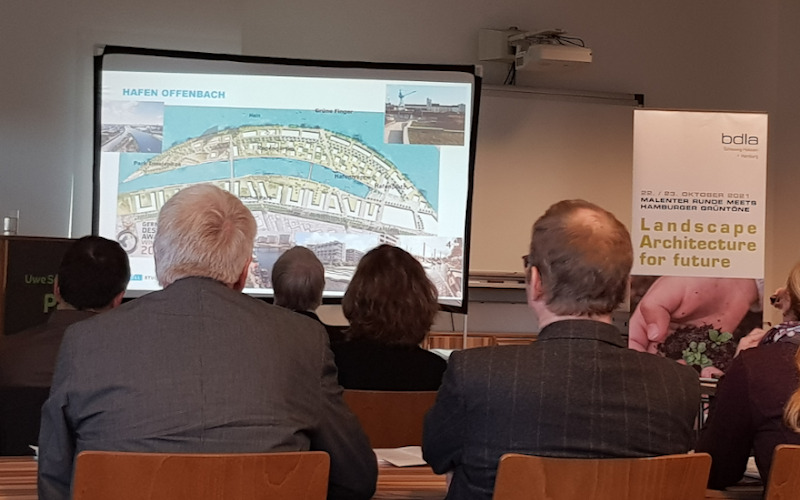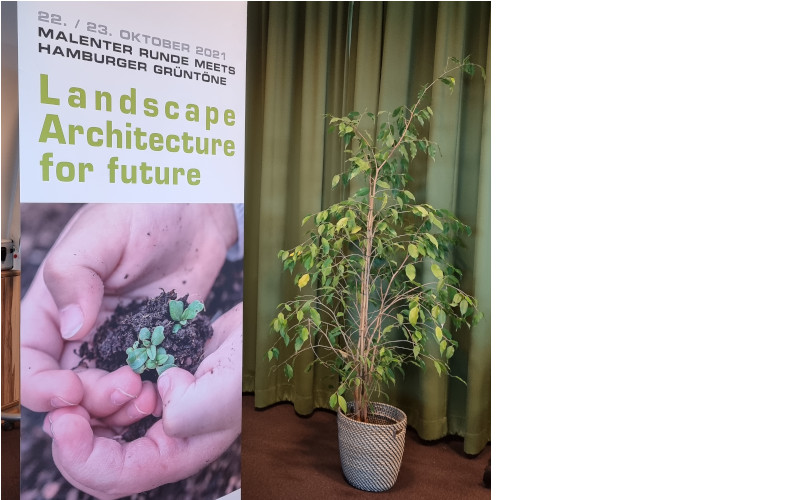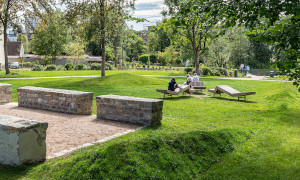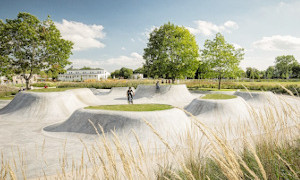The traditional event Malenter Runde of the bdla Schleswig-Holstein took place on the last weekend of October 2021 - finally! - took place again, this time as a cooperative event with the Hamburg regional association.

A nice reunion - the Malenter Runde is back!
The two northern associations of the bdla have been in close contact for several years and complement and support each other in the organization of events. The Hamburg association chairman Holger Paschburg took over the moderation, while the Schleswig-Holsteiners bore the main burden of preparation and implementation this time.
The cooperation Malenter Runde meets Hamburger Grüntöne will take place in 2023 under the opposite sign as Hamburger Grüntöne meets Malenter Runde in the Hanseatic city. Let's see if a similar depth of content can be achieved on the Elbe.
The two days in the sports park in Malente were filled with two topics that dealt with future tasks: Sustainability and School.
The speakers on the first day, Angelika Jacob (bdla), Prof. Antje Stokman (HafenCity University), Prof. Sebastian Fiedler (TH Lübeck), Herbert Brüning (Stabsstelle Nachhaltiges Norderstedt) and Christoph Duckart (Ramboll Studio Dreiseitl) covered a wide range of topics, from fundamental issues to concrete implementation, without the lectures getting lost in the familiar shorelessness of the topic of sustainability. The point is to start at the essential points when it comes to issues of climate-sensitive planning and stormwater management, and not just omit superficial show effects.
The day ended with an amusing debate about the good and bad sides of standardization and certification between Prof. Bettina Oppermann (Leibniz University) and Philip Haggeney (RMP Stephan Lenzen Landscape Architects), a topic that had previously been prepared by Prof. Hendrik Laue (TH Ostwestfalen-Lippe) no less good-humoredly and skillfully with the Guidelines for Sustainable Open Spaces - dramaturgically successful and informative as well as entertaining to the end.

What remains? The renewed knowledge that landscape architecture - as a cross-sectional discipline that integrates other specialist planners, takes into account process design and social aspects of the use of space - is working on the levers for coping with climate change.
Saturday was entirely dedicated to the topic of schools. First, reports were given on the practice of teaching building culture by the two professional chambers from Hamburg and Kiel. Susanne Szepanski (Hamburg Chamber of Architects) and Sara Dreidemie (Schleswig-Holstein Chamber of Architects and Engineers) were able to make clear how fundamentally important it is to train spatial and aesthetic perception in children and at the same time to anchor an active attitude towards the built environment, i.e. the will to design.
It also became clear that financial support and personal commitment, as in the school projects described, are true investments in the future, worth every hour and every euro spent, and actually not worth the money.
The day and the event as a whole were concluded with two practical projects from Weimar and Schleswig. Sabine Rabe, (rabe landschaften / arge studio urbane landschaften) presented the StadtLandSchule Weimar, a model project funded by the Montag Foundation, which focused on the process structure and the design of adapted building forms.
For accidental or intentional contrast, the A.P.Møller Skolen in Schleswig was then presented by Martin Keßler and Christine Krämer (kessler.krämer landscape architects). A top-down project, financed through to the end by the investor and realized with high quality standards, which impresses not only as a building and with its interior, but also with an unprecedented and envy-inducing generosity in the open spaces.
The Weimar example, on the other hand, was more bottom up, sparse, without a prescribed design language: but even this project is not transferable to every place in its design. Both schools presumably give their students a lot to work with. An exchange from the practical use of the schools and their outdoor spaces would be interesting.
Conclusion from two days: Finally again Malenter round, please again more Malenter round and so further and again the possibility for the reflection of the own work and projects.
Hamburg, 09.12.2021
Berthold Eckebrecht
Landscape architect BDLA
The following speakers have kindly provided their scripts:
-
pdf
Duckart: Lebenswerte und klimaangepasste Stadtlandschaften
(16.19 MB)
PDF -
pdf
Fiedler: Herausforderung Klimaneutraler Gebäudebestand
(6.65 MB)
PDF -
pdf
Laue: Nachhaltige Freianlagen. Ein Leitfaden
(10.29 MB)
PDF -
pdf
Rabe: Schulbau Open Source Planungbaukasten
(9.69 MB)
PDF -
pdf
Stokman: Probleme in Parks verwandeln
(17.74 MB)
PDF -
pdf
Szepanski: Architektur und Schule in Hamburg
(6.48 MB)
PDF
- Latitude: 0
- Longitude: 0


